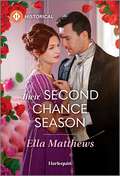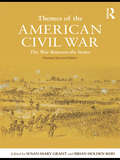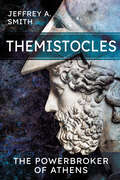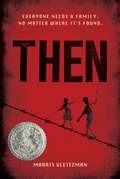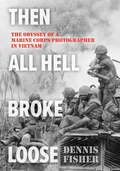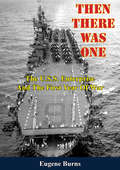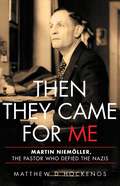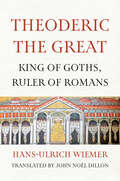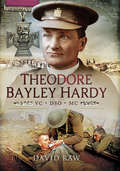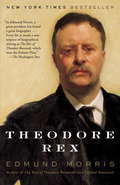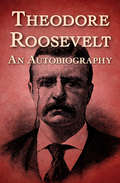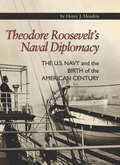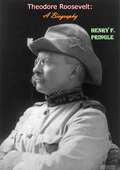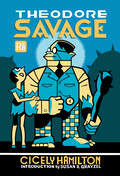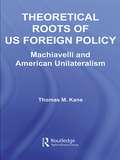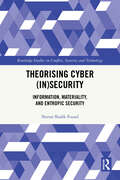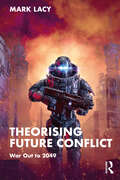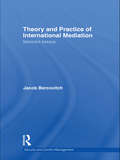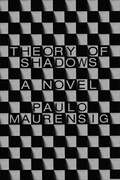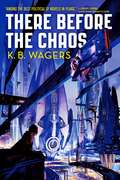- Table View
- List View
Their Second Chance Season (A Season to Wed)
by Ella MatthewsFour soldiers face their greatest battle yet—in the Regency marriage mart! Don&’t miss the third installment of A Season to Wed. Can a ballroom reunion… Lead to a union at the altar? War hero James Ashworth needs a rich wife to restore his family&’s fortune. Despite the scars battle left on his soul, he&’ll do his duty—even if everywhere he turns, he sees the woman he loved and lost… Meeting James catapults widow Amelia back to the past—the letters he stopped responding to while at Waterloo and her subsequent forced marriage. Yet, when she discovers her father&’s role in the Ashworths' misfortune, she&’s compelled to help—even if she has no intention of falling for the man who broke her heart! From Harlequin Historical: Your romantic escape to the past.A Season to WedBook 1: Only an Heiress Will Do by Virginia HeathBook 2: The Viscount's Forbidden Flirtation by Sarah RodiBook 3: Their Second Chance Season by Ella MatthewsBook 4: The Lord's Maddening Miss by Lucy Morris
Their Texas Christmas Gift (Lockharts Lost & Found #5)
by Cathy Gillen ThackerCan two strangers…Become family this Christmas? Widow Faith Lockhart Hewitt is getting the ultimate Christmas gift in adopting a baby boy. But when the baby&’s father, navy SEAL Lieutenant Zach Callahan, shows up, a marriage of convenience gives Faith a son and a husband! As the holidays approach, Faith and Zach are drawn closer together. But she&’s already lost one husband and her second is about to be deployed. Can raising their son show them love is the only thing that matters?From Harlequin Special Edition: Believe in love. Overcome obstacles. Find happiness.Lockharts Lost & FoundBook 1: His Plan for the QuintupletsBook 2: Four Christmas MatchmakersBook 3: The Twin ProposalBook 4: Their Texas TripletsBook 5: Their Texas Christmas Gift
Themes of the American Civil War: The War Between the States
by Susan-Mary Grant Brian ReidThemes of the American Civil War offers a timely and useful guide to this vast topic for a new generation of students. The volume provides a broad-ranging assessment of the causes, complexities, and consequences of America’s most destructive conflict to date. The essays, written by top scholars in the field, and reworked for this new edition, explore how, and in what ways, differing interpretations of the war have arisen, and explains clearly why the American Civil War remains a subject of enduring interest. It includes chapters covering four broad areas, including The Political Front, The Military Front, The Race Front, and The Ideological Front. Additions to the second edition include a new introduction – added to the current introduction by James McPherson – a chapter on gender, as well as information on the remembrance of the war (historical memory). The addition of several maps, a timeline, and an appendix listing further reading, battlefield statistics, and battle/regiment/general names focuses the book squarely at undergraduates in both the US and abroad.
Themistocles: The Powerbroker of Athens
by Jeffrey A. SmithA biography of the architect of victory in the Persian Wars of 490 and 480/479 BC: &“A valuable read for anyone with an interest in the &‘Golden Age&’ of Greece.&” —The NYMAS Review This is an exciting new biography of Themistocles of Athens, architect of the Greek victory over the Persian invasions of 490 BC and 480 to 479 BC. While his role in the Persian wars is naturally a major theme, Themistocles&’ career before and after those conflicts is also considered in detail. Themistocles was a leading exponent of a new kind of populist politics in the young democracy of Athens, manipulating the practice of ostracism (exile) to get rid of his political rivals. Jeffrey Smith explains Themistocles&’ rise to a position of virtual hegemony which allowed him to institute his far-sighted policy of preparation against the growing Persian threat. In particular he strengthened Athens&’ fleet and thereby secured the support of the poor thetes, who found employment as rowers. During the first invasion, Themistocles fought, and possibly held joint command, at the decisive battle of Marathon. When the Persians struck again in 480, he commanded the fleet at Artemisium and Salamis. The latter battle he won by subterfuge, securing Athens&’ liberation and survival. Ironically he was himself eventually ostracized by his fellow citizens—and ultimately entered Persian service, ending his days as governor of Magnesia in Asia Minor.
Themistocles: The Powerbroker of Athens
by Jeffrey A. SmithA biography of the architect of victory in the Persian Wars of 490 and 480/479 BC: &“A valuable read for anyone with an interest in the &‘Golden Age&’ of Greece.&” —The NYMAS Review This is an exciting new biography of Themistocles of Athens, architect of the Greek victory over the Persian invasions of 490 BC and 480 to 479 BC. While his role in the Persian wars is naturally a major theme, Themistocles&’ career before and after those conflicts is also considered in detail. Themistocles was a leading exponent of a new kind of populist politics in the young democracy of Athens, manipulating the practice of ostracism (exile) to get rid of his political rivals. Jeffrey Smith explains Themistocles&’ rise to a position of virtual hegemony which allowed him to institute his far-sighted policy of preparation against the growing Persian threat. In particular he strengthened Athens&’ fleet and thereby secured the support of the poor thetes, who found employment as rowers. During the first invasion, Themistocles fought, and possibly held joint command, at the decisive battle of Marathon. When the Persians struck again in 480, he commanded the fleet at Artemisium and Salamis. The latter battle he won by subterfuge, securing Athens&’ liberation and survival. Ironically he was himself eventually ostracized by his fellow citizens—and ultimately entered Persian service, ending his days as governor of Magnesia in Asia Minor.
Then
by Morris GleitzmanFelix and Zelda have escaped the death camp train, but where do they go now? They're two runaway kids in Nazi-occupied Poland during World War II and the Holocaust. Danger lies at every turn of the road. With the help of a woman named Genia and their active imaginations, Felix and Zelda find a new home and begin to heal, forming a new family together. But can it last? Morris Gleitzman's winning characters will tug at readers' hearts as they struggle to survive in the harsh political climate of Poland in 1942. Their lives are difficult, but they always remember what matters: family, love, and hope.
Then All Hell Broke Loose: The Odyssey of a Marine Corps Photographer in Vietnam
by Dennis FisherOne Marine, one camera, and a front-row seat to history—Then All Hell Broke Loose is a gripping visual journey through the Vietnam War.The USNS Hugh J. Gaffey dropped anchor at 1430 hours on December 27, 1966, under an overcast sky at Da Nang, Vietnam. Standing on deck and taking his first look at Vietnam was PFC Dennis Irwin Fisher, a newly minted Marine infantry rifleman. A snafu on his orders would send him to the Headquarters 1st Marine Division personnel office as &“unassigned&” and from there to the Division Security Platoon. As fate would have it, the Security Platoon hooches were just a short walk from the 1st Division Photo Lab. After six months of effort and agreeing to extend his tour of duty for an additional six months, Lance Corporal Fisher was transferred to Division Photo and assigned a secondary MOS as a 4631 combat still photographer. His training as an infantryman, position as a combat photographer, and his civilian training as a photojournalist provided him with a unique skill set and vantage point from which to record the actions of the Marines during the heaviest fighting of the Vietnam War. Then All Hell Broke Loose follows the young Marine photographer through seven large operations and numerous smaller actions, his wounding and two-month hospital stay, and his return to Vietnam just as the Tet Offensive broke out. Fisher&’s photographs display the trials and tribulations of combat and the humanity of the men fighting day in and day out. Some have been featured by the National Archives for their insightful depictions of the Vietnam War, but most are published here for the first time, presenting a unique and dramatic view of this generation-defining conflict.
Then There Was One: The U. S. S. Enterprise And The First Year Of The War
by Eugene BurnsWith the war in the Pacific well into its new, offensive phase, the best carrier story of the war can now be told. It is the story of the Enterprise, one of the Navy's greatest fighting ships, the first carrier to receive the rarely awarded Presidential Citation. Of the seven first-line U. S. carriers when war began, four were sunk in the first year of war, another saw action in non-Pacific waters during the period involved, and another was out of action at the decisive moment. Then there was one--the Enterprise. Virtually alone, it held the long, thin Pacific line against overwhelming odds. It was part of the too little which was not, luckily for us, too late.Then There Was One is a story of men--like Admiral "Bill" Halsey, who rode the Big E as his flagship; Air Group Cmdr. McClusky who, in what was officially termed "the most important decision of the entire action, helped win the Battle of Midway; Cmdr. Turner Caldwell whose decision to take eleven Enterprise planes to Guadalcanal helped determine the fate of the Solomons; young Lt. "Birney" Strong who fulfilled a life's ambition and scratched one Jap flattop; Ensign Neal Scott whose dying letter to his parents is one of the most moving documents of the war--of these men and many others.It is a story of battles--from that first Sunday morning when the Enterprise was returning to Pearl Harbor as the Japs were attacking it, right down through every major carrier action, save one, with the Big E writing one of the grandest record-breaking pages in naval history: 29 Jap ships sunk and 185 Jap planes destroyed. It is a story of courage and heroism in the face of two of the heaviest air attacks ever launched against any American ship by the enemy.This is the carrier story long awaited by those who have followed our progress in the Pacific. For those who have not, it will be an exciting and inspiring eye-opener. This is it--the grand, glorious, and victorious first year of the U.S.S. Enterprise.
Then They Came for Me: Martin Niemöller, the Pastor Who Defied the Nazis
by Matthew D Hockenos"First they came for the Communists, and I did not speak out-Because I was not a Communist..." Few today recognize the name Martin Niemöller, though many know his famous confession. In Then They Came for Me, Matthew Hockenos traces Niemöller's evolution from a Nazi supporter to a determined opponent of Hitler, revealing him to be a more complicated figure than previously understood. Born into a traditionalist Prussian family, Niemöller welcomed Hitler's rise to power as an opportunity for national rebirth. Yet when the regime attempted to seize control of the Protestant Church, he helped lead the opposition and was soon arrested. After spending the war in concentration camps, Niemöller emerged a controversial figure: to his supporters he was a modern Luther, while his critics, including President Harry Truman, saw him as an unrepentant nationalist. A nuanced portrait of courage in the face of evil, Then They Came for Me puts the question to us today: What would I have done?
Theoderic the Great: King of Goths, Ruler of Romans
by Hans-Ulrich WiemerThe first full-scale history of Theoderic and the Goths in more than seventy-five years, tracing the transformation of a divided kingdom into a great power &“A monumental exploration. . . . It is the most important treatment of its subject since Wilhelm Ensslin&’s 1947 biography, and since Mr. Wiemer&’s book (here in John Noël Dillon&’s fluid English translation) surpasses its predecessor in breadth and sophistication, the author can claim the laurel of having written the best profile of Theoderic we have.&”—Kyle Harper, Wall Street Journal In the year 493, the leader of a vast confederation of Gothic warriors, their wives, and children personally cut down Odoacer, the man famous for deposing the last Roman emperor in 476. That leader became Theoderic the Great (454–526). This engaging history of his life and reign immerses readers in the world of the warrior-king who ushered in decades of peace and stability in Italy as king of Goths and Romans. Theoderic transformed his roving &“warrior nation&” from the periphery of the Roman world into a standing army that protected his taxpaying Roman subjects with the support of the Roman elite. With a ruling strategy of &“integration through separation,&” Theoderic not only stabilized Italy but also extended his kingdom to the western Balkans, southern France, and the Iberian Peninsula. Using sources as diverse as letters, poetry, coins, and mosaics, Hans-Ulrich Wiemer brings readers into the world of Theoderic&’s court, from Gothic warriors and their families to the notables, artisans, and shopkeepers of Rome and Ravenna to the peasants and enslaved people who tilled the soil on grand rural estates. This book offers a fascinating history of the leader who brought peace to Italy after the disintegration of the Roman Empire.
Theodore Bayley Hardy VC DSO MC: A Reluctant Hero
by David RawIn 1916, at the age of fifty four, a slight, short sighted, unassuming country vicar and local school master became an Army Chaplain. Theodore Bayley Hardy was destined to become the most decorated noncombatant in the First World War. He was to be awarded the Victoria Cross, the D.S.O., and the M.C. By day he performed the usual priestly and chaplaincy tasks but by night he would work the trenches dropping in with his inimitable "It's only me!" to bring comfort and moral and spiritual support in the nightmare of wars.Sadly, he was to die of wounds only a few days before the Armistice.
Theodore Rex: The Rise Of Theodore Roosevelt, Theodore Rex, And Colonel Roosevelt
by Edmund MorrisTheodore Rex is the story--never fully told before--of Theodore Roosevelt's two world-changing terms as President of the United States. A hundred years before the catastrophe of September 11, 2001, "TR" succeeded to power in the aftermath of an act of terrorism. Youngest of all our chief executives, he rallied a stricken nation with his superhuman energy, charm, and political skills. He proceeded to combat the problems of race and labor relations and trust control while making the Panama Canal possible and winning the Nobel Peace Prize. But his most historic achievement remains his creation of a national conservation policy, and his monument millions of acres of protected parks and forest. Theodore Rex ends with TR leaving office, still only fifty years old, his future reputation secure as one of our greatest presidents.From the Trade Paperback edition.
Theodore Roosevelt
by Theodore RooseveltThe firsthand account of the life of adventurer, scholar, war hero, and twenty-sixth president of the United States Theodore Roosevelt.There must be the keenest sense of duty, and with it must go the joy of living. Here, in his own words, Theodore Roosevelt recounts his remarkable journey from a childhood plagued with illnesses to the US presidency and beyond. With candor and vivid detail, this personal account describes a life guided by a restless intelligence, a love for adventure, and an unflagging duty to his country. Roosevelt sheds light on his wide array of roles, from New York police commissioner, where he waged a battle against corruption, to cattle rancher in the Dakotas to assistant secretary of the US Navy under William McKinley to leader of the legendary Rough Riders at the outbreak of the Spanish–American War, when he led the 1st United States Volunteer Cavalry to victory in the Battle of San Juan Hill. These extraordinary accomplishments earned Roosevelt national fame and set the stage for his ascent to the White House. As twenty-sixth president of the United States, he ushered in the Progressive Era with his domestic policies, such as the Square Deal, and trust-busting of monopolies, such as Standard Oil. He was a war hero, scholar, statesman, adventurer, and Nobel Peace Prize winner. Theodore Roosevelt: An Autobiography provides unique insight into the truly remarkable life of one of America’s most beloved presidents. This ebook has been professionally proofread to ensure accuracy and readability on all devices.
Theodore Roosevelt and the Great White Fleet: American Sea Power Comes of Age
by Kenneth WimmelKenneth Wimmel gives a new appraisal of the rise of the US Navy and Theodore Roosevelt's influence upon its development.
Theodore Roosevelt's Naval Diplomacy
by Henry J. HendrixThis book examines President Theodore Roosevelt's use of the United States naval services as supporting components of his diplomatic efforts to facilitate the emergence of the United States as a Great Power at the dawn of the 20th century. After reviewing the development of Roosevelt's personal philosophy with regard to naval power, the book traverses four chapters that reveal Roosevelt's use of the Navy and Marine Corps to support American interests during the historically controversial Venezuelan Crisis (1902-03), Panama's independence movement (1903), the Morocco-Perciaris Incident (1904) and the choice of a navy yard as the sight for the negotiations that ended the Russo-Japanese War. The voyage of the Great White Fleet and Roosevelt's actions to technologically transform the American Navy are also covered. In the end the book details how Roosevelt's actions combined to thrust the United States forward onto the world's stage as a major player, and cemented T.R's place in American history as a great president despite the fact that he did not serve during a time of war or major domestic disturbance. This history provides new information that finally lays to rest the controversy of whether Theodore Roosevelt did or did not issue an ultimatum to the German and British governments in December, 1902, bringing the United States to the brink of war with two of the world's great powers. It also reveals a secret war plan developed during Panama's independence movement which envisioned the United States Marine Corps invading Colombia to defend the sovereignty of the new Panamanian republic.
Theodore Roosevelt: A Biography
by Henry F. PringleDive into the extraordinary life of the 26th President of the United States with Henry Pringle's meticulously researched and captivating biography, "Theodore Roosevelt: A Biography." This definitive work provides an in-depth look at one of America's most dynamic and influential leaders.Theodore Roosevelt was a man of many contradictions: a passionate conservationist who relished hunting, a fierce advocate for justice who reveled in the rough-and-tumble world of politics, and a warrior for peace who earned the Nobel Peace Prize. Pringle masterfully captures the essence of Roosevelt’s complex character, chronicling his journey from a sickly child to a robust and adventurous leader who reshaped the American presidency.Pringle's biography delves into Roosevelt's formative years, his relentless drive for reform as New York City's Police Commissioner, his valor in the Spanish-American War, and his groundbreaking policies as President, including the Square Deal and his efforts to regulate big business. The book also explores Roosevelt’s personal life, his enduring legacy, and his post-presidential adventures, highlighting his indomitable spirit and relentless pursuit of progress.Winner of the Pulitzer Prize, "Theodore Roosevelt: A Biography" offers a nuanced and engaging portrait of a man whose energy, intellect, and patriotism left an indelible mark on the nation. Whether you're a history enthusiast or new to the world of Roosevelt, this biography provides a comprehensive and compelling narrative of one of America's most beloved and influential figures.
Theodore Roosevelt: An Autobiography
by Theodore RooseveltTheodore Roosevelt: An Autobiography recounts the decorated soldier and esteemed politician's life from his earliest remembrances through his years as a Rough Rider and his eight years in the White House.Be it mystery, romance, drama, comedy, politics, or history, great literature stands the test of time. ClassicJoe proudly brings literary classics to today's digital readers, connecting those who love to read with authors whose work continues to get people talking. Look for other fiction and non-fiction classics from ClassicJoe.
Theodore Savage: A Story Of The Past Or The Future (MIT Press / Radium Age)
by Cicely HamiltonFrom one of the earliest feminist science fiction writers, a novel that envisions the fall of civilization—and the plight of the modern woman in a post-apocalyptic wilderness.When war breaks out in Europe, British civilization collapses overnight. The ironically named protagonist must learn to survive by his wits in a new Britain. When we first meet Savage, he is a complacent civil servant, primarily concerned with romancing his girlfriend. During the brief war, in which both sides use population displacement as a terrible strategic weapon, Savage must battle his fellow countrymen. He shacks up with an ignorant young woman in a forest hut—a kind of inverse Garden of Eden, where no one is happy. Eventually, he sets off in search of other survivors . . . only to discover a primitive society where science and technology have come to be regarded with superstitious awe and terror. A pioneering feminist, Hamilton offers a warning about the degraded state of modern women, who—being &“unhandy, unresourceful, superficial&”—would suffer a particularly sad fate in a postapocalyptic social order.
Theoretical Roots of US Foreign Policy: Machiavelli and American Unilateralism (Contemporary Security Studies)
by Thomas M. KaneThis volume explores the reasons why American leaders from the 1700s onwards frequently adopt policies of unilateralism. Thomas M. Kane presents fresh explanations for America’s invasion of Iraq and defiance of international agreements, which go much deeper than conventional critiques of particular presidents to examine the real significance of the September 11 attacks. As the only and unprecedented sole superpower, the US faces a range of new and complex problems. Kane draws on the thinking of Machiavelli to illuminate and assess the key challenges for both the US and the global community. This unique book: connects contemporary US policy to patterns that reach back to America’s founding explores political dynamics affecting all republics contributes to theoretical debates about the benevolence, or otherwise, of American democracy highlights the key issues that Americans and non-Americans alike must address now and in the future. Theoretical Roots of US Foreign Policy will be of great interest to all students of US foreign policy, strategy and history and of international relations, politics and strategic studies in general.
Theorising Cyber: Information, Materiality, and Entropic Security (Routledge Studies in Conflict, Security and Technology)
by Noran Shafik FouadThis book argues that cybersecurity’s informational ontology offers empirical challenges, and introduces a new interdisciplinary theoretical and conceptual framework of ‘entropic security’.Cyber-attacks have been growing exponentially in number and sophistication; ranging from those conducted by non-state actors to state-backed cyber-attacks. Accordingly, cybersecurity now constitutes an integral part of public, private, and academic discourses on contemporary (in)security. Yet, because its emergence as a novel security field occurred after many long-established frameworks had already been developed, cybersecurity has been repeatedly scrutinised for its compatibility with conventional security theories, concepts, and understandings, particularly with that of military security. This book, however, argues that cybersecurity differs profoundly from many other security sectors because of the ontological nature of ‘information’ that sits at the heart of this field. Through this new framework, the book investigates three key empirical challenges in cybersecurity that are co-produced by its informational ontology: (1) the disordered nature of cybersecurity and its tendency towards increasing insecurity as a manifestation of the intrinsic uncertainties in information systems; (2) the unpredictable and unintended consequences resulting from autonomous cyber-attacks that challenge human control of cybersecurity environments; and (3) the persistent harms engendered by ‘mundane’ cyber threats that do not fit within conventional understandings of existentiality in security theories. Through a detailed analysis of cybersecurity discourses and practices in the USA (2003-present), the book goes on to show how these complex cybersecurity challenges are better analysed and theorised through the new information-theoretic notion of ‘entropic security’.This book will be of much interest to students of cyber-security, critical security studies, science and technology studies and International Relations in general.
Theorising Future Conflict: War Out to 2049 (Routledge Studies in Conflict, Security and Technology)
by Mark LacyThis book explores the changing tactics, technologies and terrains of twenty-first century war. It argues that the world in 2049 is unlikely to look like the climate change/artificial intelligence (AI) dystopia depicted in Blade Runner 2049, but nor will it be a world where conflict and war has been transformed by a ‘civilising process’ that eradicates violence and conflict from the human condition. 2049 is also the year that the US Department of Defense has suggested China will become a world-shaping military power. All states will be engaged in ‘arms races’ across a variety of new tools and technologies—from drones, robotics, AI and quantum computing—that will transform politics, economy, society and war. Drawing on thinkers such as Zygmunt Bauman and Paul Virilio, the book suggests that future war will be shaped by three broad tendencies that include a broad range of tactics, technologies and trends; the impure, the granular and the machinic. Through discussions of cybersecurity, urban war, robotics, AI, climate change, science fiction and new strategic concepts, it examines how these tendencies might evolve in the different geopolitical futures and types of war ahead of us. The book provides a thought-provoking and distinctive framework through which to think about the changing character of war. It concludes that for all the novel and dangerous challenges ahead, the futuristic possibilities of warfare will likely continue to be shaped by problems familiar to students of international relations and the history of war—albeit problems that will play out in geopolitical and technological contexts that we have never encountered before. This book will be of much interest to students of critical war studies, security studies, science and technology studies, and International Relations in general.
Theory and Practice of International Mediation: Selected Essays (Routledge Studies in Security and Conflict Management)
by Jacob BercovitchThis volume brings together some of the most significant papers on international conflict mediation by Professor Jacob Bercovitch, one of the leading scholars in the field. It has become common practice to note that mediation has been, and remains, one of the most important structures of dealing with and resolving social conflicts. Irrespective of the level of political or social organization, of their location in time and space, and of the political sophistication of a society, mediation has always been there to help deal with conflicts. As a method of conflict management, the practice of settling disputes through intermediaries has had a rich history in all cultures, both Western and non-Western. In some non-Western countries (especially in the Middle East and China) mediation has been the most important and enduring structure of conflict resolution. Jacob Bercovitch has been at the forefront of developments in international conflict mediation for more than 25 years, and is generally recognized as one of the most important scholars in the field. His theoretical and empirical analyses have come to define the parameters in the study of mediation. This volume will help scholars and practitioners trace the history of the field, its position today and its future and will be of much interest to all students of mediation, negotiation, conflict management, international security and international relations in general.
Theory and Research on the Causes of War
by Dean G. PruittThe collection is divided into seven parts. This provides a progress report on recent scholarly developments, particularly in the United States. Twenty selected readings and seven introductory essays are presented.
Theory of Shadows: A Novel
by Paulo MaurensigThe strange circumstances surrounding the death of the world chess champion and alleged Nazi collaborator Alexander Alekhine, as investigated by a literary grand masterOn the morning of March 24, 1946, the world chess champion Alexander Alekhine—“sadist of the chess world,” renowned for his eccentric behavior as well as the ruthlessness of his playing style—was found dead in his hotel room in Estoril, Portugal. He was fully dressed and wearing an overcoat, slumped back in a chair, in front of a meal, a chessboard just out of reach. The doctor overseeing the autopsy certified that Alekhine died of asphyxiation due to a piece of meat stuck in his larynx and assured the world that there was absolutely no evidence of suicide or foul play. Some, of course, have commented that the photos of the corpse look suspiciously theatrical, as though staged. Others have wondered why Alekhine would have sat down to his dinner in a hot room while wearing a heavy overcoat. And what about all these rumors concerning Alekhine’s activities during World War II? Did he really pen a series of articles on the inherent inferiority of Jewish chess players? Can he really be seen in photographs with high-ranking Nazi officials? And as for his own homeland, is it true that the Russians considered him a traitor, as well as a possible threat to the new generation of supposedly superior Soviet chess masters?With the atmosphere of a thriller, the insight of a poem, and a profound knowledge of the world of chess (“the most violent sport there is,” according to the Russian world champion Garry Kasparov), Paolo Maurensig’s Theory of Shadows leads us through the life and death of Alekhine: not so much trying to figure out whodunit as using the story of one infuriating and unapologetic genius to tease out “that which the novel alone can discover.”
There Before the Chaos (The Farian War #1)
by K. B. WagersThe first volume of an epic space opera trilogy featuring the gunrunner empress Hail Bristol, who must navigate alien politics and deadly plots to prevent an interspecies war.The battle for the throne is over. The war for the galaxy is just beginning.Hail Bristol, infamous galactic gunrunner and former runaway princess, never expected to inherit the throne of Indrana. But after avenging the murder of her entire family and cleansing the Empire of usurpers in a bloody civil war, the former outlaw must fulfill her duties to her people. Hail retires her gun and throws herself into the rebuilding of her Empire. Her hard-won peace is short-lived. When Indrana's closest ally asks Hail to intervene in an interstellar military crisis, she embarks on the highest stakes diplomatic mission the Empire has ever faced. Caught between two alien civilizations at each other's throats, she must uncover each side's true intentions before all of humanity becomes collateral damage in a full-blown galactic war.There Before the Chaos begins a fresh, pulse-pounding space opera series from an exciting new voice in science fiction.For more from K. B. Wagers, check out:The Indranan WarBehind the ThroneAfter the CrownBeyond the Empire
